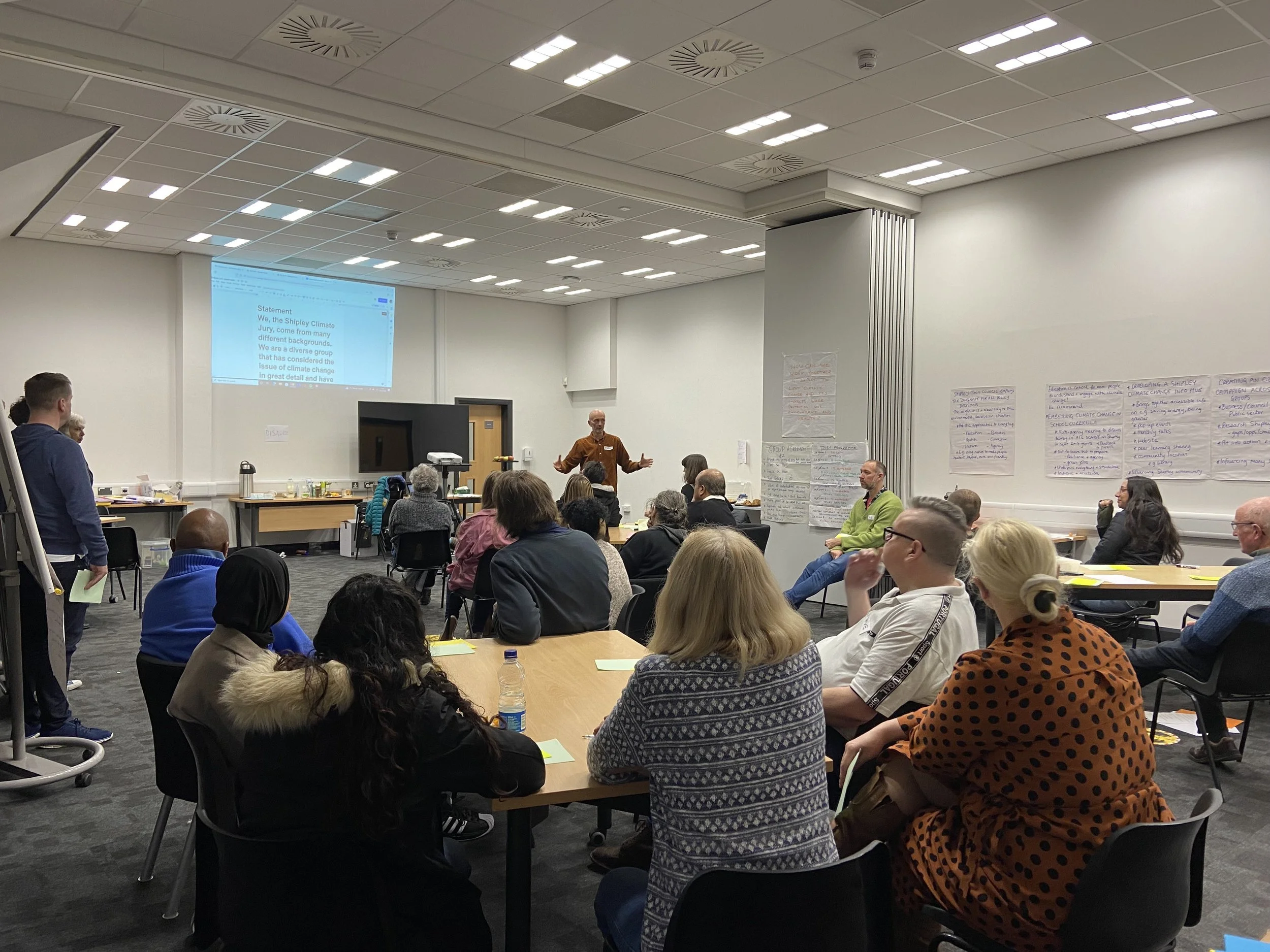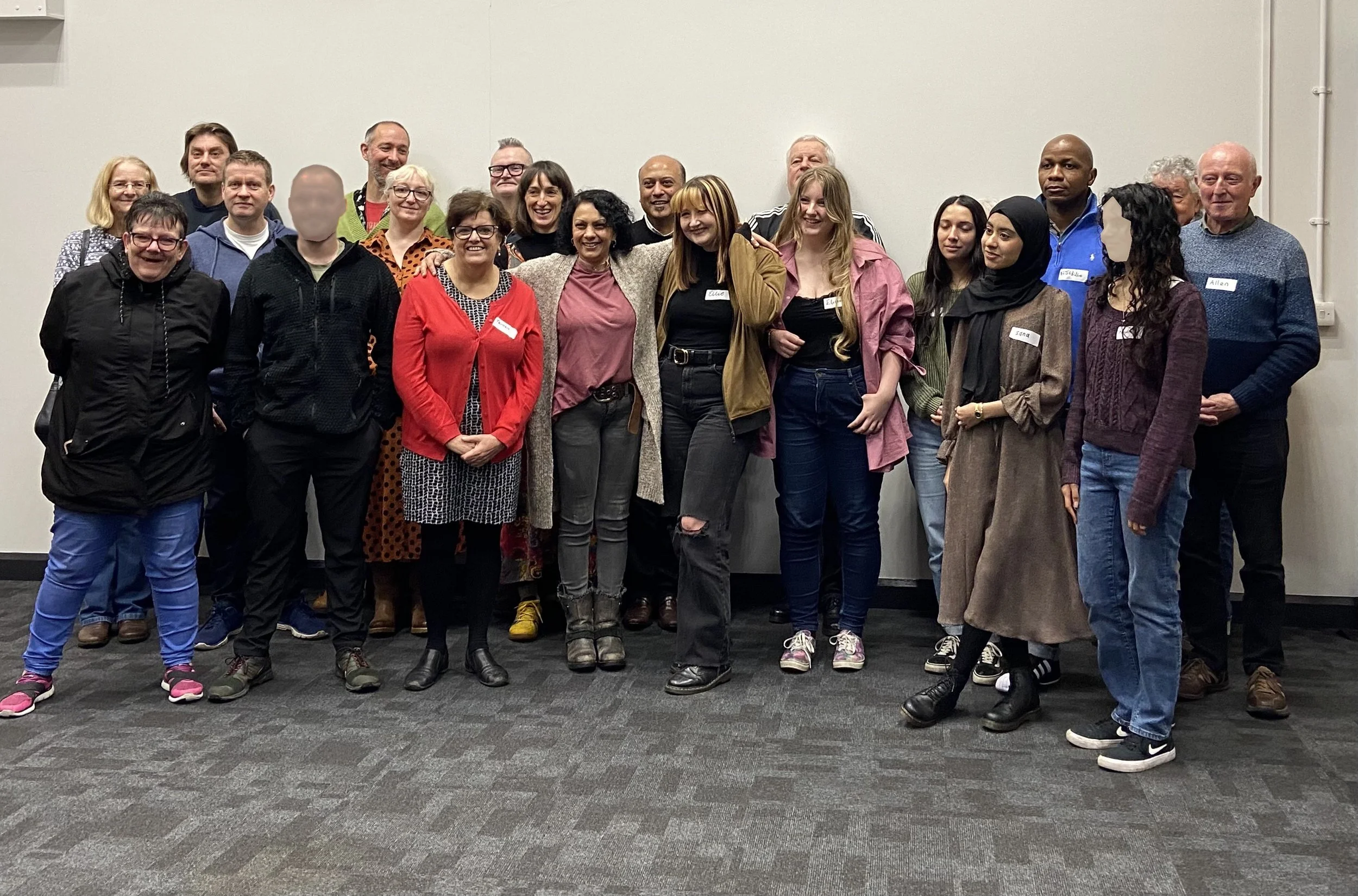A radical shift in how (I-we) see the world
Jury members sharing their priority recommendations
Jury members taking part in the day of recommendation writing
I’ve had the privilege of co-facilitating a citizens jury on climate change over the last 8 weeks. It’s been a fascinating process.
Commissioned by a recently formed Shipley Town Council the instigator Town Councillor Paul McHugh has been clear on the vision from the start: To create a mandate to tackle climate change at a local level here in Shipley.
As a local resident I was super interested in being involved. Having never taken part or heard much about citizens jury processes in the past I was curious to see what happens when citizens are supported to step up and take control. Having worked in the collaborative design world for many years I’m all too familiar with the pull and push of ‘open processes’ aimed to funnel residents towards an all too often decided outcome or scheme. The anxiety around genuinely trusting the public to develop and deliberate policy at a local level is not to be underestimated and exists across all well meaning professional areas.
This process, expertly guided and overseen by Pete Bryant of Shared Future CIC was a pleasure to be a part of as a protected neutral facilitator. For once, I was able to let go (almost completely!) of where we were trying to go. My role was to channel my energy into ensuring all jury members are heard, discussions are inclusive and the space held to create a safe environment for deliberation and ultimately the creation of the jury’s 15 or so recommendations.
The 25 jury members drawn from across the Shipley area were specifically selected to mirror our census demographic. Participants aged from 17 to 74, living in social housing, privately renting and in their own homes. Members of the jury answered the question ‘how concerned are you about climate change?’ along the full spectrum of concern.
The key validity in the creation of a citizens jury is that the membership is a robust and representative group of ‘ordinary folk’ (as one jury member described it). Not members of the local lefty, green groups — not the usual suspects. A genuine representation across income and education brackets, those living with disabilities and without, those who have lived in the area a long time and others who are new to the area.
With a skeleton process outlined by Pete, of approximately three-four sessions to introduce the jury members to each other and hear from respected commentators on ‘what is climate change?’, ‘where are emissions coming from locally?’ and ‘how change happens?’ the jury members are then empowered to decide what they would like to hear more about over the following three sessions. They’re then asked to come together to deliberate and vote on the final recommendations. I’m convinced the trust created through this genuinely citizen led process is what leads to the openness to radically shift thinking on local issues relating to climate change such as transport and how we share street space.
Having worked for many years on community based schemes to collaboratively design traffic calming schemes, (to do many of the things the jurors have specified they want to see happen through their recommendations) and have been met with a huge amount of backlash and vitriol. Despite high levels of relationship building locally (over not just months but often years), assessing streets and prioritising issues collaboratively, transparently undertaking meaningful public engagement followed by an inclusive design process.
But ultimately a scheme, for all it’s worth (potentially saving lives by making it safer to walk or cycle and making it harder to drive) is being imposed upon people. From local government, from central government.. whilst being as much as possible from the bottom up, if we’re honest, it’s top down. And that might be what’s needed. I mean 76% of people want more government intervention in our lives around climate change… the quiet majority of people living in low traffic neighbourhoods have loved the transition to quiet, safer, healthy streets that are now places for all sorts of activities other than driving and storing cars. People want leadership around this. Do we just need to get on and do more of it? But perhaps there is a way to take people with us? A way to demonstrate categorically to local councillors for example that a cross section of their local population want them to lead on this on their behalf. They support urgent change and radical action.
The Shipley Citizens Jury on Climate Change 2022
My takeaway from this citizens jury process, is the openness of participants to get behind a vision and passion around the potential of this type of work (specifically how streets and spaces are used) because they are coming to it as the power holders. They have heard inspiring commentators on a range of issues they have chosen. They have been given a variety of perspectives and different viewpoints from those working in both policy and delivery — at regional and local level. They have been supported and given time and space to interrogate and question the evidence commentators have brought to them.
Each participant has taken up a civic role as members of Shipley Citizens Jury on climate change. Tasked with the important and significant work of understanding how we can urgently tackle and change how we live here in Shipley to reduce our emissions and live well and better together. Through this process they have been given permission to both take and determine action. This responsibility looks different for every member of the jury but is significant in terms of impact.
There’s been debate in the jury about whether to describe the process that the jurors have been on as moving from ‘me thinking’ to ‘we thinking’. Is it twee? Is it cliche? Perhaps, but it’s one of the only processes that I’ve seen work so gently and organically, ensuring local people lead the conversation on the future of our local leadership on the issues we care about.
And lastly, don’t believe the media — everyone in the jury, across the perceived ‘social divide’ cares strongly about tackling climate change and living differently in order to do so and leaving no-one behind.
How’s that for some warmth and good cheer as the dark, cold evenings draw in when it can feel like everything is in chaos!?



